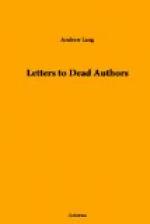To all which, most worshipful, thou didst answer wisely: saying that Hera could not be both night, and earth, and water, and air, and the love of sexes, and the confusion of the elements; but that all these opinions were vain dreams, and the guesses of the learned. And why—thou saidst—even if the Gods were pure natural creatures, are such foul things told of them in the Mysteries as it is not fitting for me to declare. ’These wanderings, and drinkings, and loves, and corruptions, that would be shameful in men, why,’ thou saidst, ’were they attributed to the natural elements; and wherefore did the Gods constantly show themselves, like the sorcerers called were-wolves, in the shape of the perishable beasts?’ But, mainly, thou didst argue that, till the philosophers of the heathen were agreed among themselves, not all contradicting each the other, they had no semblance of a sure foundation for their doctrine.
To all this and more, most worshipful Father, I know not what the heathen answered thee. But, in our time, the learned men who stand to it that the heathen Gods were in the beginning the pure elements, and that the nations, forgetting their first love and the significance of their own speech, became confused and were betrayed into foul stories about the pure Gods—these learned men, I say, agree no whit among themselves. Nay, they differ one from another, not less than did Plutarch and Porphyry and Theagenes, and the rest whom thou didst laugh to scorn. Bear with me, Father, while I tell thee how the new Plutarchs and Porphyrys do contend among themselves; and yet these differences of theirs they call ‘Science’!
Consider the goddess Athene, who sprang armed from the head of Zeus, even as—among the fables of the poor heathen folk of seas thou never knewest— goddesses are fabled to leap out from the armpits or feet of their fathers. Thou must know that what Plato, in the ‘Cratylus,’ made Socrates say in jest, the learned among us practise in sad earnest. For, when they wish to explain the nature of any God, they first examine his name, and torment the letters thereof, arranging and altering them according to their will, and flying off to the speech of the Indians and Medes and Chaldeans, and other Barbarians, if Greek will not serve their turn. How saith Socrates? ’I bethink me of a very new and ingenious idea that occurs to me; and, if I do not mind, I shall be wiser than I should be by to-morrow’s dawn. My notion is that we may put in and pull out letters at pleasure and alter the accents.’ Even so do our learned—not at pleasure, maybe, but according to certain fixed laws (so they declare); yet none the more do they agree among themselves. And I deny not that they discover many things true and good to be known; but, as touching the names of the Gods, their learning, as it standeth, is confusion. Look, then, at the goddess Athene: taking one example out of hundreds. We have dwelling in our coasts Muellerus, the most erudite of the doctors of the Alemanni, and the most golden-mouthed. Concerning Athene, he saith that her name is none other than, in the ancient tongue of the Brachmanae, Ahana’, which, being interpreted, means the Dawn. ‘And that the morning light,’ saith he, ’offers the best starting-point; for the later growth of Athene has been proved, I believe, beyond the reach of doubt or even cavil.’ (1)




